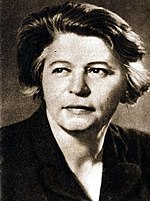Vice President of the United Commonwealth
| Vice President of United Commonwealth of Continentalist States | |
|---|---|
| Presidium of the National People's Congress | |
| Style |
Mr. Vice President (informal) His/her Excellency (diplomatic) |
| Status | Deputy legislative branch officer |
| Member of | Presidium of the National People's Congress |
| Seat | Chicago, Illinois |
| Constituting instrument | United Commonwealth Constitution |
| Formation | May 1, 1921 (as Vice President of the Continentalist States) |
| First holder | William Z. Foster (as Vice President of the Continentalist States) |
The Vice President of the United Commonwealth of Continentalist States is the first deputy to the President of the United Commonwealth, and a senior member of the Presidium of the National People's Congress, the permanent body of the highest ranking legislative body in the United Commonwealth. The vice president is indirectly elected by the people of the United Commonwealth through a vote by the National People's Congress, along with the rest of the Presidium, often at the nomination of a current or outgoing president. By law, the vice president must be a Continental citizen of 35 years of age or older, and as of the current constitution may not serve in this position for over ten years collectively. The vice president's duties include assisting the President, and assuming the role of acting president should he/she resign or die in office until the next election. On a day-to-day basis, the vice president acts no differently than any other member of the Presidium, being tasked with creating and overseeing the implementation of legislation, and as such the title of vice president is mostly ceremonial. The vice president often has a role in acting as a representative of the nation in foreign affairs and events.
The office of the vice president, along with its powers and responsibilities, has evolved over the course of the United Commonwealth's history. As part of the de jure collective leadership structure of the Presidium as a collective head of state, the vice presidency was initially an unofficial position designating the second most senior person in the body. Historically the office of vice president was often conferred upon potential successors, or was used as a springboard to achieving the status of paramount leader after the death of the previous leader, as was the case for William Z. Foster and Jack Tracy respectively. As per the 1982 Constitution of the United Commonwealth, the office of vice president has been codified as an official position. Although theoretically the vice president is the second-in-command to the president and assumes the role of acting president during a vacancy in the presidency, in practice the vice president is often not the second most senior member of Continental leadership, based on their position within the Secretariat of the United Commonwealth. The longest serving vice president was Samson Zima, who held the office for 18 years from 1922 to 1940.
The current Vice President of the United Commonwealth is Clark S. Key, who took office on 20 January 2019 during the presidency of Anthony Malito. He continues to serve through the presidency of Daniel Muir following the 2020 United Commonwealth legislative election.
History
Powers and roles
Selection process
Tenure
Office and staff
List of Vice Presidents
| No. | Portrait | Vice President (lifetime) |
Term | Election | NPC | President |
|---|---|---|---|---|---|---|
| 1 | 
|
William Z. Foster (1881–1923) |
1 May 1922 – 23 September 1922 |
– |
|
Aeneas Warren |
| Vacancy during the First Triumvirate from 23 September 1922 to 2 December 1922 | ||||||
| 2 | 
|
Samson Zima (1873–1946) |
2 December 1922 – 20 November 1940 |
|||
| 4 | 
|
Ava Brown (1890–1965) |
20 November 1940 – 20 November 1944 |
|
||
| 5 | 
|
Jack Tracy (1903–1982) |
20 November 1944 – 1 June 1947 |
|
||
| Vacancy from 1 June 1947 to 20 November 1948 | ||||||
| 6 | 
|
Daniel Plainview (1908–1999) |
20 November 1948 – 3 August 1950 |
|
||
| Vacancy from 3 August 1950 to 20 November 1952 | ||||||
| 7 | 
|
Elaine Carroll (1900–1981) |
20 November 1952 – 19 December 1958 |
|||
| Vacancy from 19 December 1958 to 20 November 1960 | ||||||
| 8 | 
|
Raymond Beshear (1906–1999) |
20 November 1960 – 20 November 1968 |
|||


